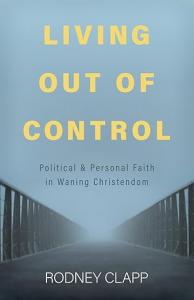Here I take up Chapter Six of Rodney Clapp’s book Living Out of Control: Political and Personal Faith in Waning Christendom. The title is “The Anarchistic Tendency and Christian Citizenship.” If you have read the chapter, feel free to comment. If not, only ask a question.
I often tell my students to read the last paragraph of a chapter first. Often an author tells his or her thesis there. Here it is: “Let us, then, embrace the Christian anarchistic tendency and recognize that Christians are citizens in the world. We can live out of control in the sense of not lording it over others, and in the sense of coming out from under the control of others. The Black church shows that it can be so.” (85)
According to Rodney, Christians are called to NOT embrace any ideology or party or government AS IF it were the kingdom of God or anything even close to that. That is the gist of the chapter. I couldn’t agree more.
When I read the title of the chapter I thought of a book I read years ago—Christian Anarchy: Jesus’ Primacy over the Powers by theologian Vernard Eller. That was my introduction to Christian anarchy. Rodney refers to Eller and that book throughout this chapter.
So what is Christian Anarchy? Here is Rodney’s concise expression of it: “So long as history lasts, Christians will be perpetually dissatisfied. Awaiting the eschaton, the church is ever on a pilgrimage, never fully at home. It will not confuse any political or cultural arrangement with the kingdom of God arrived in its completeness or perfection.” (72)
So, Christian anarchy is holding firmly to Jesus Christ as the only Lord and holding very loosely to any political or cultural arrangement. This-worldly political and cultural arrangements are necessities and not necessarily evil ones. But they are never worthy of Christian veneration or attachment.
Christians, Rodney argues, can engage with politics and be involved with culture, but always and only with a degree of “distance,” never fully immersing themselves in them. When it comes to Christian activism in political affairs, “we should never try to play an explicitly Christian trump card.” (83)
I hear echoes of what I have argued here before about “mediating principles”—social-ethical concepts that are secular but congenial to Christian beliefs and commitments.
Rodney concludes by referring to the Black churches in America and how they have chosen to live in some degree of tension with American political and cultural arrangements while speaking into them about equality and freedom.
I agree with Rodney’s message in this chapter. I guess I am a Christian anarchist—as Anabaptists traditionally have been, everywhere they have lived. It is not the case that we want all government abolished; it is the case that we reserve the right to disagree with political and cultural arrangements, standing somewhat apart from them and calling them into question when they demand our agreement or participation.
*Note: If you choose to comment, make sure you have read the chapter. If not, you may ask a question. In any case, keep it relatively brief (no more than 100 words), on topic, addressed to me, civil and respectful (not hostile or argumentative), and devoid of pictures or links.












